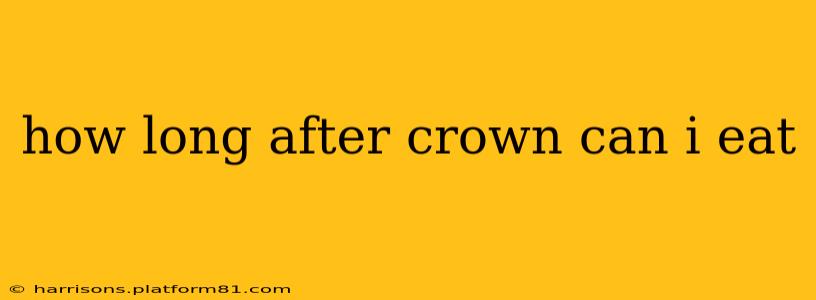Getting a dental crown is a significant step in restoring your oral health, but the recovery process involves some dietary adjustments. Many patients wonder, "How long after a crown can I eat?" The answer isn't a simple number of hours or days, but rather depends on several factors. This comprehensive guide will delve into the specifics, addressing common concerns and providing valuable advice for a smooth post-procedure recovery.
What Happens After a Dental Crown is Placed?
Immediately following the placement of a dental crown, your mouth will likely feel a little numb from the local anesthetic. The temporary sensitivity around the newly crowned tooth is perfectly normal. Your dentist will provide specific post-operative instructions, but generally, you’ll need to avoid chewing or biting on that tooth for several hours. This allows the cement to fully set and ensures the crown stays securely in place.
How Soon Can I Eat After Getting a Crown?
Most dentists recommend waiting at least 2-3 hours after the procedure before eating anything substantial. This initial period allows the anesthetic to wear off completely and gives the cement time to begin its hardening process. Even then, you should stick to soft foods for the first 24 hours.
What Can I Eat After Getting a Crown?
During the first 24 hours after your crown placement, focus on soft foods that are easy to chew and won't put excessive pressure on the new crown. Good options include:
- Yogurt: A protein-rich and easily digestible choice.
- Applesauce: Smooth and gentle on sensitive teeth.
- Mashed potatoes: Creamy and requires minimal chewing.
- Scrambled eggs: Soft and packed with protein.
- Soups (broth-based): Nourishing and easy to consume.
- Oatmeal: A comforting and easily chewed option.
What Foods Should I Avoid After Getting a Crown?
It's crucial to avoid certain foods and drinks for several days after the procedure. These include:
- Hard foods: Nuts, hard candies, ice, and popcorn can dislodge the crown.
- Sticky foods: Caramel, taffy, and chewing gum can also pull the crown loose.
- Tough foods: Steak, raw vegetables, and chewy breads require extensive chewing, which could put undue stress on the crown.
- Extremely hot or cold foods and drinks: These can cause sensitivity and discomfort.
How Long Until I Can Eat Normally After a Dental Crown?
After the initial 24-hour period of soft foods, you can gradually reintroduce firmer foods into your diet. However, it's advisable to continue avoiding extremely hard, sticky, or chewy foods for at least a week. After about a week, most individuals can return to their normal diet. However, it is still vital to maintain good oral hygiene practices.
What if My Crown Feels Loose?
If your crown feels loose at any point, even after several days, it’s essential to contact your dentist immediately. A loose crown could indicate a problem with the cement or the fit of the crown itself, and prompt attention will prevent further complications.
Can I Eat Anything Sticky Right Away?
No, you should definitely avoid anything sticky for at least 24 hours (and ideally longer) after getting a crown. Sticky foods can easily pull at the cement, potentially dislodging the crown.
Will My Crown Come Off if I Eat Certain Foods?
While unlikely with a well-placed crown, eating exceptionally hard or sticky foods increases the risk of dislodgement. This is why it’s best to avoid them during the initial healing period.
How Can I Prevent My Crown from Coming Loose?
Following your dentist's instructions carefully is key. Maintaining good oral hygiene, avoiding hard and sticky foods, and regularly visiting your dentist for checkups are all crucial to ensure the longevity of your crown.
Remember, your dentist is the best source of information regarding your specific case. Always follow their personalized post-operative instructions for optimal recovery and a long-lasting crown. This guide provides general information only and should not be considered a substitute for professional dental advice.
